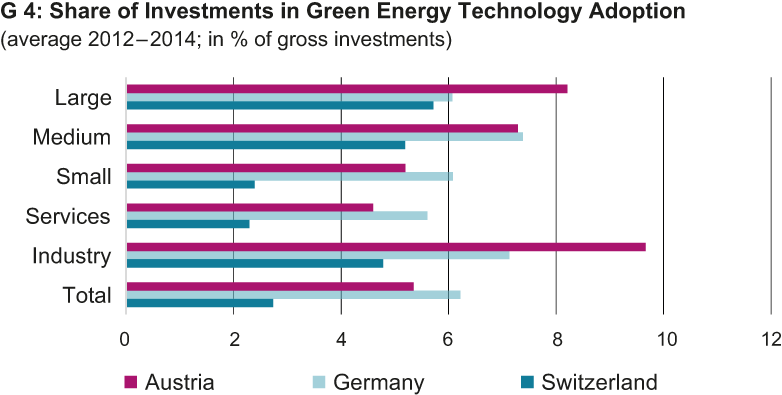The Impact of Energy Policy Measures from a Corporate Point of View
- KOF Bulletin
- Energy
New research conducted by KOF in conjunction with the WIFO Institute in Austria and the ZEW Institute in Germany shows that energy policies can stimulate the adoption of green energy technologies without reducing companies’ national or international competitiveness.

The classic arguments against energy policy measures are anticipated higher production costs (purchase of expensive machinery/vehicles, higher maintenance costs, complex licensing procedures, etc.) and the associated potential loss of competitiveness of the domestic industry. However, higher costs are also juxtaposed with potential cost savings since market failure can lead to companies making sub-optimal decisions. In their frequently quoted research article, Porter and Van der Linde (1995) argue that market interventions may even lead to better decision results.
Based on their article, the respective economic literature has broken down the impact of environmental policy into two stages (Jaffe and Palmer 1997). In the first stage, policies impact on the adoption of green technologies (weak Porter hypothesis). In the second stage, the adoption of green technologies, triggered by the policies, impacts on the performance of the companies (strong Porter hypothesis). In their article, Porter and Van der Linde argue that both impacts can be positive (see G 3). It is therefore unclear whether economic policy intervention has a negative effect on the competitiveness of the economy in this case.
In conjunction with WIFO in Austria and ZEW in Germany, KOF Zürich has analysed the impact of energy policies on companies in the context of NRP 71 (National Research Programme entitled ‘Controlling energy consumption’). As a first step, the researchers investigated the effects of policy measures on the adoption of energy-efficient technologies and technologies generating energy from renewable sources (in short: green energy technologies). As a second step, they researched the impact of policies on labour productivity and the companies’ international competitiveness.
The study was based on a dedicated survey among companies in Germany, Austria and Switzerland. To ensure comparability of the data, the surveys were conducted at the same time in all three countries, and a uniform questionnaire was used. On top of this, the data are representative of the respective industry structures in the three countries.1
Prevalence of green energy technologies in international comparison
According to the survey results, 40 per cent of the companies in Germany, 32 per cent of the companies in Austria and 25 per cent of the companies and Switzerland had adopted at least one new green energy technology in the period 2012-2014 (see Arvanitis et al. 2016a). Among the average of all companies, the share of green energy technology investments in total investments amounted to 6.2 per cent in Germany, 5.3 per cent in Austria and 2.7 per cent in Switzerland (see G 4). All in all, the results show that adoption of green energy technologies in Switzerland is relatively low, not least in comparison with companies in the neighbouring countries.
Impact of energy policy measures on adoption activities
According to the weak Porter hypothesis, policies can contribute towards an increase in benefits and hence the adoption of energy technologies. A first study was conducted to verify this hypothesis (see Woerter et al. 2016). The study concludes that policy instruments do increase adoption of green energy technologies. Fiscal measures, voluntary agreements and standards as well as subsidies all have a positive impact on the probability of companies introducing respective technologies. ‘Regulation’ is the only factor that was not associated with a significant effect. On the one hand, this may be due to the fact that companies were already meeting the regulations before the survey period, or that the regulations reflect the technological status quo and do not offer any additional incentives. On the other hand, the results of the study show that the policy measures primarily impact on the propensity or adoption likelihood of green technologies. ‘Subsidies’ are the only measure that also increases adoption intensity, i.e. they result in companies investing more in energy technologies than comparable, unaffected companies.
Impact of energy policies on productivity and international competitiveness
Policies can therefore effectively serve as an instrument for raising the adoption of energy-saving technologies. The question arises how this affects the economic performance of the companies. The impact of energy policies on the economic performance of the companies was researched in two further studies. In conjunction with the strong Porter Hypothesis, the studies investigated whether or not the policy-driven adoption of green energy technologies has a positive impact on the companies’ performance. Arvanitis et al. (2016b) studied the correlation between investments in energy technologies and labour productivity. All in all, the indirect effect of policy measures on productivity appears to be of minor importance. While regulation, voluntary measures and subsidies fail to make any additional positive contributions, investments induced by fiscal measures deliver positive effects.
The issue of the correlation between energy policy measures and the international competitiveness of companies is the focus of numerous discussions and was investigated in Rammer et al. (2016). Policy measures can raise companies’ costs and may have a negative impact on their competitiveness. In the reference period 2012-2014, econometric analysis shows no significant correlation. On the one hand, this may be due to the fact that, for the average of all companies, the additional accosts are negligible, or that the additional costs could not be passed on through higher prices.
Hence the data did not confirm the strong Porter Hypothesis. Contrary to the classic arguments used by opponents of energy policy measures, neither did the studies identify any negative impact.
Conclusion
All in all, the results show that energy policies may stimulate the adoption of green energy technologies without reducing the companies’ national or international competitiveness. In general, it is likely that such stimuli are necessary to ensure that green energy technologies are adopted at a broad level. The data show that the share of energy costs in turnover is very low: 1.3 per cent in Germany, 2.7 per cent in Austria and 1.4 per cent in Switzerland. Accordingly, managers have few incentives to invest in green energy technologies on their own account. However, it should be noted that, although the potential savings may be low in each individual case, the contribution towards an environmentally compatible, sustainable economy at the aggregated level across all companies is significant.
(1) In total, the survey was sent to 6,374 German companies, 7,091 Austrian companies and 5,789 Swiss companies. Analysable data were received from 2,321 German companies (response rate: 36%), 539 Austrian companies (response rate: 8%) and 1815 Swiss companies (response rate: 31%) (see Arvanitis et al. 2016a).
Literature:
Arvanitis, S., M. Peneder, C. Rammer, A. Spescha, T. Stucki and M. Woerter (2016a): Creation and Adoption of Energy-related Innovations – the Main Facts, KOF Studies No. 77, Zürich.
Arvanitis, S., M. Peneder, C. Rammer, A. Spescha, T. Stucki and M. Woerter (2016b): Development and Utilization of Energy-related Technologies, Economic Performance and the Role of Policy Instruments, KOF Working Paper No. 419, Zürich.
Jaffe, A. B. and K. Palmer (1997): Environmental regulation and innovation: a panel data study. Review of Economics and Statistics, 79(4), 610-619.
Porter, M. E. and C. van der Linde (1995): Toward a new conception of the environment-competitiveness relationship, The Journal of Economic Perspectives, 9(4), 97-118.
Rammer, C., S. Gottschalk, M. Peneder,M. Woerter, T. Stucki and S. Arvantitis (2016): Does Energy Policy Hurt International Competitiveness of Firms? A Comparative Study for Germany, Switzerland and Austria, KOF Working Paper No. 418, Zürich.
Woerter, M., T. Stucki, S. Arvanitis, C. Rammer and M. Peneder (2016): The adoption of green energy technologies: the role of policies in an international comparison, KOF Working Paper No. 411, Zürich.
Contact
KOF Konjunkturforschungsstelle
Leonhardstrasse 21
8092
Zürich
Switzerland

